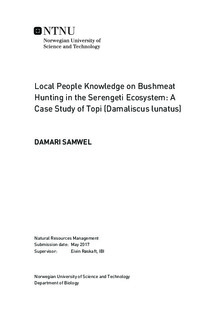Local People Knowledge on Bushmeat Hunting in the Serengeti Ecosystem: A Case Study of Topi (Damaliscus lunatus)
Master thesis
Permanent lenke
http://hdl.handle.net/11250/2445483Utgivelsesdato
2017Metadata
Vis full innførselSamlinger
- Institutt for biologi [2575]
Sammendrag
Illegal harvesting is considered the most significant threat to biodiversity in conservation in Africa. The Serengeti National Park (SENAPA), Tanzania, is facing a similar problem since its establishment in the 1950s. Wildlife populations are being reduced through illegal hunting, causing local extinction of some species in the SENAPA. Illegal hunting is mainly due to poverty as a result of human population increase. I examined knowledge of wildlife and bush meat hunting among the local communities living in the Serengeti and Busega districts to the west of SENAPA and the Ngorongoro district to the east. Questionnaires were employed to acquire information from 200 randomly selected respondents within four villages bordering the park. Results indicate that communal knowledge of wildlife and bushmeat hunting were significantly affected by gender, tribe and age. Furthermore, tribes living in the western part of the ecosystem and women in general had a more limited knowledge of wildlife. However, older people and those tribes from the western Serengeti reported to consume more topi meat compared to eastern tribes. Most of male respondents from Maasai tribe indicated high percentage on explaining the presence of topi in their area. Methods used to obtain topi meat differs, with tribes living in the western Serengeti ecosystem using more snares while those from eastern part prefer use of bows and arrows.The degree of knowledge on wildlife does not reflect community members involvement in illegal wildlife use as most of those with high knowledge on wildlife were from the eastern part where there is limited illegal wildlife hunting. There is a need for improved conservation education programs as well as delivery of alternative sources of protein such as fish, beef, chicken coupled by fair prices that can compete with lower prices of bushmeat. Nonetheless, well-funded anti-poaching patrols may be a more effective way to deter bushmeat hunting.
